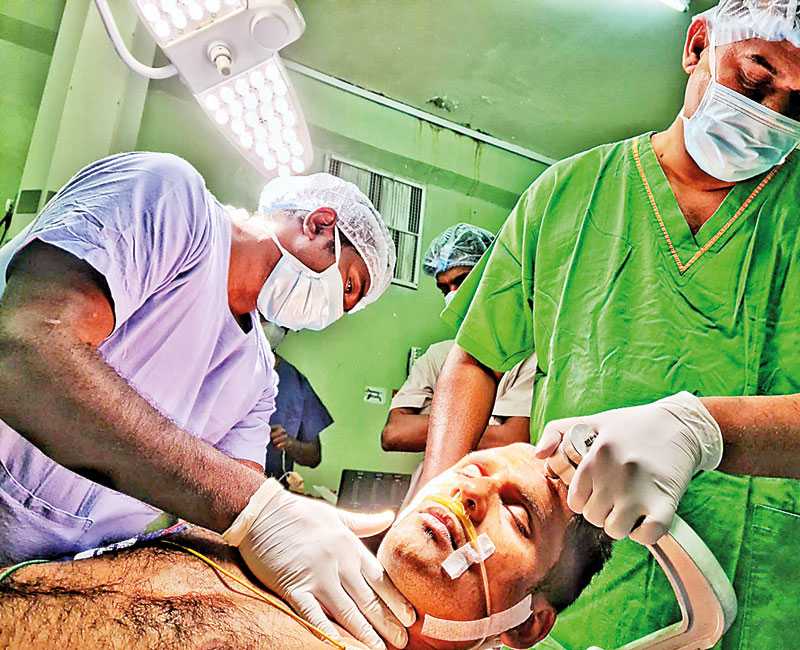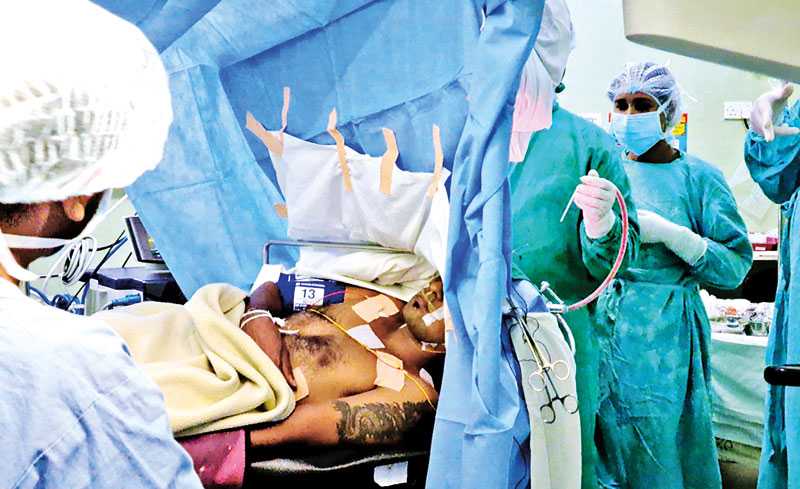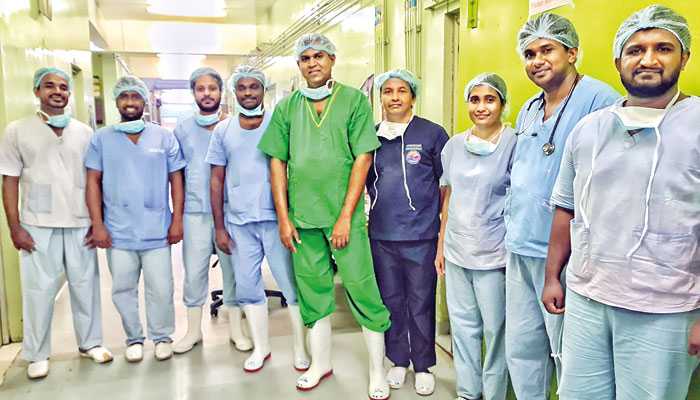Thursday Feb 19, 2026
Thursday Feb 19, 2026
Friday, 15 January 2021 00:03 - - {{hitsCtrl.values.hits}}


Surgeons at work
By Medha de Alwis
|
Patient after recovery
|
The neuro-surgical team at the Anuradhapura District General Hospital made history earlier this month by performing the first awake brain surgery in Sri Lanka. It is called Awake Craniotomy and was performed by Neuro-surgeon Dr. Madhushanka Gomes and his team for a 42-year-old farmer who was suffering from a tumour in the insular region of the brain. The patient was epileptic with fits and severe headaches and had come to a condition that the situation could not be controlled merely by medicine any longer.
Speaking to FT while recognising the assiduous efforts of his neuro-surgery colleagues and the entire surgical team, with special mention his co-neuro surgeon; Dr. Gomes explained the advantages of an awake brain surgery.
If more than 95% of the bulk of the tumour is removed, subsequent radiotherapy is easy. Removal of the tumour by surgery is essential because radiating the whole brain is not possible. Higher the portion the tumour is removed, higher is the recovery possibility of the patient. Yet, this is quite crucial when dealt with a part of the brain.
The insular region of the brain; where the particular patient had the tumour in, affects memory and cognitive functions, and it is adjutant to the part of the brain that governs language and motor function of the body. Dr. Gomes further explained that it is difficult to differentiate between the tumorous and non-tumorous material in the brain. Hence during a delicate surgery, if at least a minute portion of a non-tumorous material is removed, that could adversely affect the other, already well-functioning parts of the patient’s body; in this instance the language and motor functions. There comes the importance of awake brain surgery.
If an awake brain surgery is performed, surgeons have the ability to verify with the patient that they are removing only the tumorous parts of the brain. This is done by nerve monitoring. Dr. Gomes elaborated that there are no pain perceptions in the brain. Therefore, by sending electric impulses to a particular area, the surgeons could verify whether they are targeting only the tumorous parts that need to be removed.
It has been a six-hour long surgery, where general anaesthesia had been administered in the first hour and then the patient was woken up. Other side effects of prolonged anaesthesia would have been heart and lung suppression.
There had been a rehearsal conducted to prepare the patient for the first-ever awake surgery in the country. Dr. Gomes’ team had prepared the patient to perform specific tasks such as giving colour codes to remember. During the surgery the patient was asked questions as well as to identify shapes and colours to ascertain his mental status. Prior to the surgery the Psychiatrist at the hospital, having examined the patient had assured that the patient is not suffering from anxiety. Had the patient had any such mental disability it would not have been possible to obtain his mental cooperation during an awake surgery.
Recovery of the patient is the success story of this history making surgery. After the six-hour long awake craniotomy, the patient had been in the Intensive Care Unit only for six hours for monitoring and then one day at the ward. The very next day, he was discharged. Currently the neuro-surgical team is delighted about his convalescence and he will be further monitored for weeks prior to commencement of radio therapy.
Answering the question by FT as to when the second awake surgery would be performed, Dr. Gomes confessed in jest that he is yet to ‘recover’ though the patient recovered in one day! This is the first experience in Sri Lanka, and it has been an extremely stressful experience for the surgeons. Furthermore the amount of time in preparation and performance of an awake surgery stands as an impediment to performing many such.
In response to the FT query, as to why the mortality rate is high after performance of brain surgeries, Dr. Gomes explained that the post-rehabilitation process is not strong in Sri Lanka. Unlike the West where there is a neuro physiotherapist who looks after morbidity and quality of life of a patient who has been operated, Sri Lanka does not have any neuro physiotherapists.
“Neuro rehabilitation is essential for the success of a neuro surgery to reap its harvest and so the role of a neuro physiotherapist is vital. In the West, the patient is looked after in the process even by being with her during all functions such as walking, squatting and nutrition.” Maybe it is time that Sri Lanka fills that gap, so that a higher success rate can be expected out of the hard work of surgeons.

Surgical team